How will Donald Trump approach Israel's wars on Lebanon and Gaza?

Donald Trump is returning to the White House with a vow to end foreign wars.
In the Middle East, he faces two blistering conflicts, one in Gaza and one in Lebanon - which will test that pledge?
Trump pitched himself to American voters as a strong leader and dealmaker. When asked about Israel’s war in Gaza, he said he wanted to "get it over with and let’s get back to peace and stop killing people".
In Gaza, Israel is waging a bloody offensive that it launched after the Hamas-led 7 October 2023 attacks on southern Israel. Hezbollah began firing rockets at Israel the next day, in what it said was in solidarity with Palestinians. Israel responded with a devastating bombing campaign and ground invasion that has so far killed over 43,000 Palestinians, mostly women and children, and 3,000 Lebanese.
The fighting in Lebanon has snowballed into a sort of regional battle to realign the balance of power in the Middle East, with Israel and the US on one side and Iran and its so-called "axis of resistance" on the other.
New MEE newsletter: Jerusalem Dispatch
Sign up to get the latest insights and analysis on Israel-Palestine, alongside Turkey Unpacked and other MEE newsletters
Trump’s statements on ending the wars and disengaging from the Middle East are going to run up against his staunch support for Israel and desire to reimplement a campaign of "maximum pressure" against Iran.
"Trump will more likely see Iran as a clear threat that needs to be contained, not through war, but strict enforcement of sanctions, namely on Iran's oil exports," James Jeffrey, a former senior US official for Trump, told Middle East Eye.
"There were Ukraine-related and ideological reasons for Biden not to enforce sanctions. Trump will not have such constraints."
Trump himself said he believed Iran was in "a lot of danger" because of Israel’s attacks on Tehran's axis of resistance. Trump made the comments before Israel launched direct strikes on Iran.
Alan Pino, a former CIA and National Intelligence Council officer for the Middle East, said: "The basic starting point for Trump is going to be unquestioning support for Israel."
"So, I think Trump will be satisfied if there are movements in the right direction on ending those wars, but he won’t be obsessed with it."
Trump's Lebanon connection
Of the two conflicts, ending the war in Lebanon featured more prominently in Trump’s campaign. He specifically said he wanted to “stop the suffering and destruction” in the Mediterranean country last month.
Trump’s appeal seemingly stems in part from the influence of his Lebanese advisor Massad Boulos, whose son is married to Trump’s daughter, Tiffany. Boulos campaigned with Trump in Michigan.
In Lebanon, Trump will inherit the Biden administration's rough draft for a ceasefire. The plan calls for a beefed-up UN peacekeeping force in Lebanon, the Lebanese army deployed to the country’s southern heartland of Hezbollah, and Israel being granted more freedom to operate in Lebanon.
"Basically, it would turn Lebanon into Syria," a former senior US official in Trump’s previous administration, who has been in touch with his campaign, told MEE.
"Israel could operate at will if it feels threatened as it does in Syria, but Hezbollah wouldn't surrender its de facto power over government, like Bashar Assad."
But Pino said Hezbollah would be unlikely to cede too much ground to US demands that curb its mobility and ability to rearm.
"Hezbollah does not want to appear too weak because it fears that could encourage its domestic opponents to take advantage of them," Pino said.
"Israelis evacuated from the north will pressure for ironclad guarantees that check Hezbollah before they go back to their homes."
Around 60,000 Israelis have been displaced by Hezbollah rocket fire, and 1.2 million Lebanese have been displaced by Israel's assault.
Trump and the pathway to a Palestinian state
Trump finding a solution to the fighting in Gaza is going to be a higher mountain to climb than the war in Lebanon.
The Biden administration has refused to use arms transfers as a form of leverage against Prime Minister Benjamin Netanyahu's government to pressure Israel at the negotiating table - a step Trump is unlikely to take.
Ceasefire talks are dead, with wide gaps between Hamas and Israel.
The Palestinian group has requested a permanent end to the war in exchange for the release of hostages it holds, but Israel has refused to tie itself to a permanent ceasefire.
Israel is also insisting on control of the crossing at Rafah on the border with Egypt and maintaining control of the Netzarim Corridor bisecting northern and southern Gaza - both non-starters for Hamas.
On Tuesday, Netanyahu dismissed Defence Minister Yoav Gallant, who has been critical of continuing military action in Gaza without a political roadmap, and replaced him with a loyalist, former foreign minister, Israeli Katz.
"Your historic return to the White House offers a new beginning for America and a powerful recommitment to the great alliance between Israel and America. This is a huge victory!" Netanyahu wrote on X.
Far-right members of the Israeli government also welcomed Trump’s victory.
Itamar Ben Gvir, who has called on Israel to resettle the besieged enclave and threatened to topple Netanyahu’s government if he agrees to a ceasefire, wrote "God Bless Trump" in response to his election win.
If Trump cedes ground to Israel’s far-right settler movement, it could be the death knell for any chance of a ceasefire in the Gaza Strip.
"If Trump is smart, he has to work with the Israelis to create a pathway to a Palestinian state," Pino said.
"The US needs to think [about] what serves American interests long-term."
Middle East Eye delivers independent and unrivalled coverage and analysis of the Middle East, North Africa and beyond. To learn more about republishing this content and the associated fees, please fill out this form. More about MEE can be found here.






